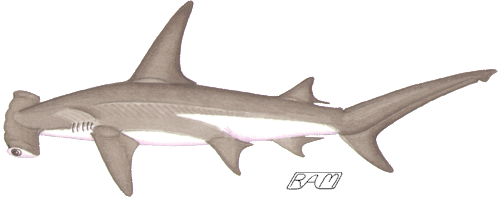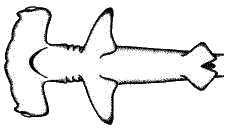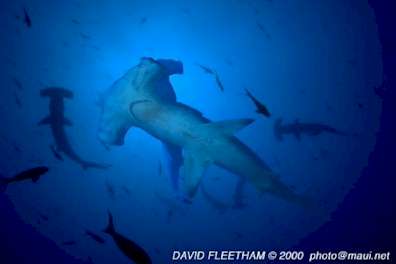Sphyrnidae - Hammerhead Sharks (original) (raw)
Family Sphyrnidae:
Hammerhead Sharks � 8+ species
The hammerheads are perhaps the most easily recognizable of sharks. To a greater or lesser extent, they all have a pronounced lateral expansion on each side of the head. The function � or functions � of this strange headgear has aroused much speculation and debate. In every other respect, however, the hammerheads closely resemble the whaler sharks of the family Carcharhinidae, which includes many species renowned for complex social behavior. But the hammerheads are not outdone by their 'normal'-headed kin in social sophistication.

Great Hammerhead (Sphyrna mokarran) is the largest species of hammerhead shark, growing to length of more than 18 feet (5.5 m)
Studies by A. Peter Klimley on schooling behavior in the Scalloped Hammerhead (Sphyrna lewini)have revealed how these sharks use a complex suite of 'body language' to establish social rank during daylight hours and use geomagnetic cues to navigate between seamounts at night, when the schools break up to hunt for prey. Given the sophistication and subtlety of their social lives, it is little wonder that carcharhinids and sphyrnids typically possess relatively large and complex brains.


In the Sea of Cortez, the Scalloped Hammerhead (Sphyrna lewini) forms polarized schools of up to 500 individuals. The structure and social dynamics of these schools has been intensively studied by A. Peter Klimley. Klimley discovered that these schools consist primarily of subadult females � averaging about 5.5 feet (1.7 metres) in length � who employ at least nine distinct postural and locomotory displays to jockey for the prime social position at the center of the school. Some of these displays are quite elaborate, including head shakes, torso thrusts, and swimming in exaggerated loops. Klimley has also demonstrated that these hammerheads use the geomagnetic signature of relatively recent lava extrusions on the sea floor as 'magnetic highways' to navigate between nightime feeding areas and return to their seamount before dawn. Why these large sharks, which have few predators, would form such large schools remains a mystery.
For more about Scalloped Hammerheads, click HERE.
The spectacular schools of Scalloped Hammerheads (Sphyrna lewini) are as mysterious as they are beautiful. Intriguingly, this species schools in numerous locations around the globe, but school composition, structure and dynamic changes from place-to-place.
Photo � David Fleetham david@davidfleetham.com; used with the gracious permission of the photographer.
